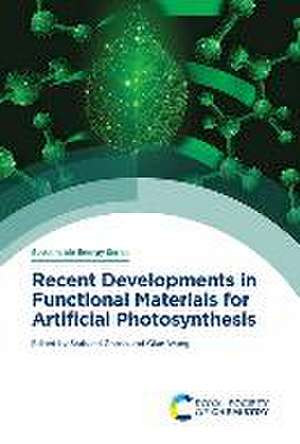Recent Developments in Functional Materials for Artificial Photosynthesis: Sustainable Energy
Editat de Srabanti Ghosh, Qian Wangen Limba Engleză Hardback – 8 mar 2023
Preț: 1239.30 lei
Preț vechi: 1361.87 lei
-9% Nou
Puncte Express: 1859
Preț estimativ în valută:
237.16€ • 246.10$ • 198.23£
237.16€ • 246.10$ • 198.23£
Carte disponibilă
Livrare economică 24 februarie-10 martie
Livrare express 07-13 februarie pentru 40.17 lei
Preluare comenzi: 021 569.72.76
Specificații
ISBN-13: 9781839164422
ISBN-10: 1839164425
Pagini: 382
Ilustrații: No
Dimensiuni: 236 x 160 x 25 mm
Greutate: 0.73 kg
Editura: RSC Publishing
Seria Sustainable Energy
ISBN-10: 1839164425
Pagini: 382
Ilustrații: No
Dimensiuni: 236 x 160 x 25 mm
Greutate: 0.73 kg
Editura: RSC Publishing
Seria Sustainable Energy
Notă biografică
Dr. Srabanti Ghosh presently working as Senior Scientist, Energy Materials & Devices Division, in CSIR - Central Glass and Ceramic Research Institute, Kolkata, India. She received her PhD degree in Chemistry from UGC-DAE Consortium for Scientific Research, Kolkata Centre, and Jadavpur University, India and completed postdoctoral programs at the University of Paris SUD, France (Marie Curie Cofund). She worked as GOT ENERGY TALENT Cofund Marie Curie Fellow Researcher in UNIVERSIDAD DE ALCALA, Spain. Her main research interests include synthesis, characterization of functional materials at nanoscale and their photoelectrochemical properties for energy conversion devices, photocatalysts, electrocatalysts, fuel cells and biosensors applications. She co-authored 80 publications in international scientific journals, 2 patent, edited 4 books and contributed 19 book chapters covering the large fields of photocatalysis, conjugated polymer, heterostructure nanomaterials, and water treatment. She routinely acts as a reviewer of SCI Journals from different editorials (RSC, ACS, ELSEVIER, Wiley, Springer Nature, MDPI, among others). Her current research work is focused on nanohybrid materials, conducting polymer nanostructures for solar light harvesting, photocatalysis applications.
Qian Wang is currently an Associate Professor at Nagoya University, Japan. She obtained her Ph.D. in 2014 at the University of Tokyo, Japan, where she worked on the development of perovskite-type oxide photocatalysts for visible-light-driven water splitting. She then worked as a postdoctoral researcher at the Japan Technological Research Association of Artificial Photosynthetic Chemical Processes (ARPChem) on the development of standalone photocatalyst devices for overall water splitting. In 2018, she became a Marie Sklodowska-Curie Research Fellow at the University of Cambridge to develop inorganic-organic hybrid photocatalysts. She joined Nagoya University as an Associate Professor in May 2021 and established her research group, which is currently developing new materials, approaches, and technologies for solar energy storage in the form of renewable fuels via artificial photosynthesis.
Qian Wang is currently an Associate Professor at Nagoya University, Japan. She obtained her Ph.D. in 2014 at the University of Tokyo, Japan, where she worked on the development of perovskite-type oxide photocatalysts for visible-light-driven water splitting. She then worked as a postdoctoral researcher at the Japan Technological Research Association of Artificial Photosynthetic Chemical Processes (ARPChem) on the development of standalone photocatalyst devices for overall water splitting. In 2018, she became a Marie Sklodowska-Curie Research Fellow at the University of Cambridge to develop inorganic-organic hybrid photocatalysts. She joined Nagoya University as an Associate Professor in May 2021 and established her research group, which is currently developing new materials, approaches, and technologies for solar energy storage in the form of renewable fuels via artificial photosynthesis.
